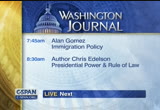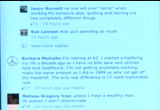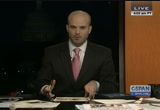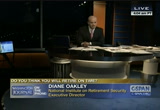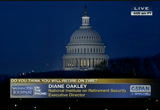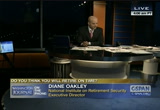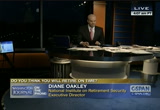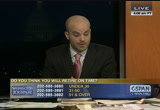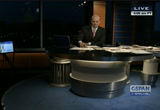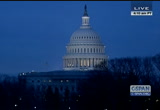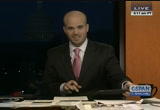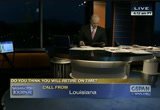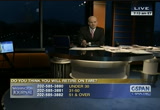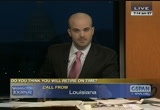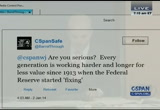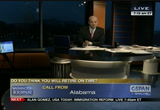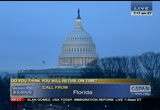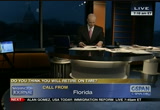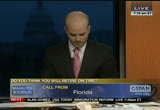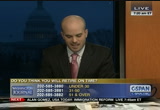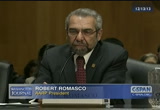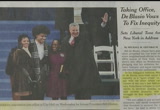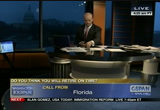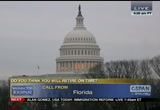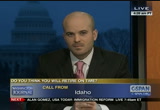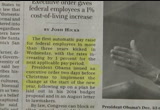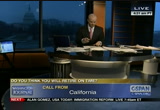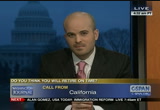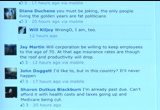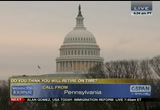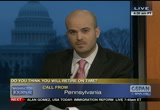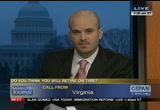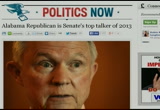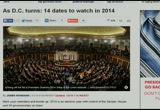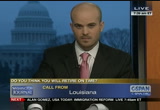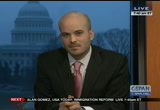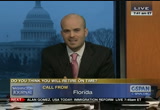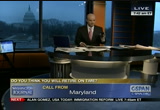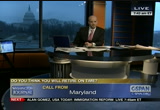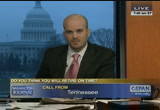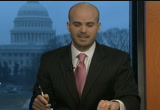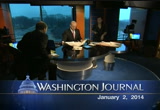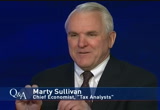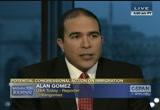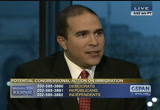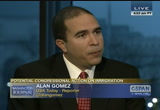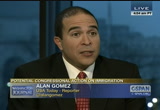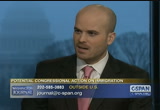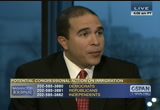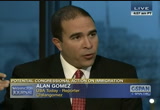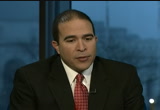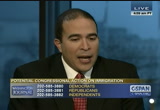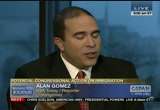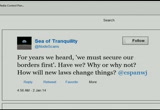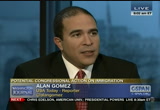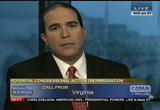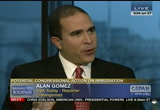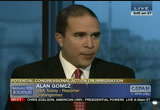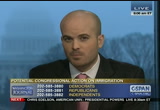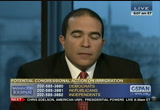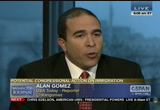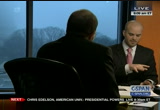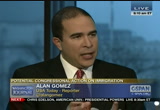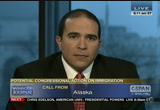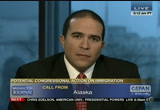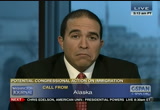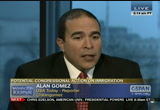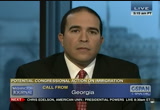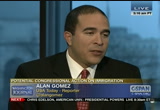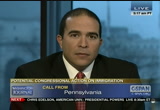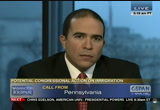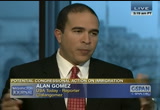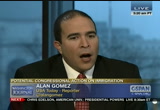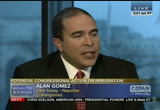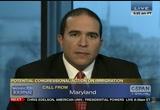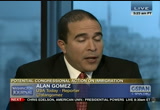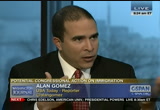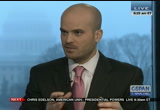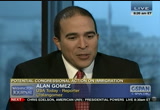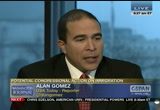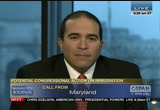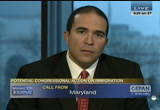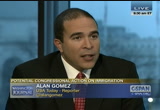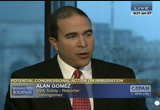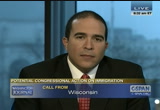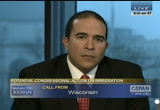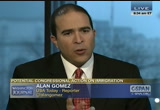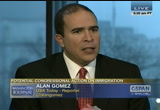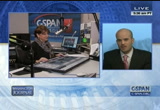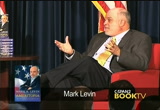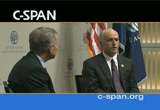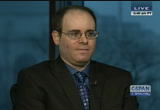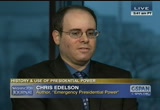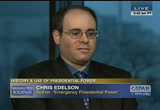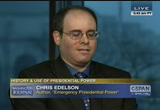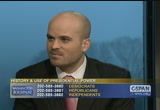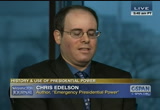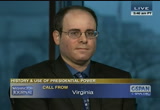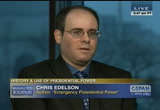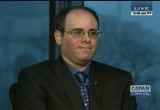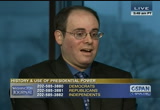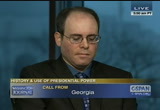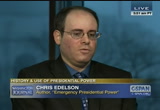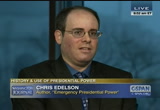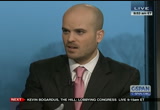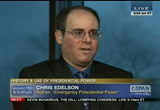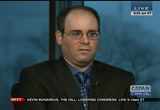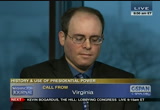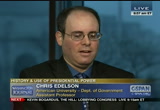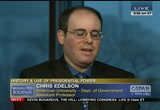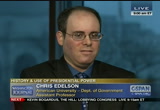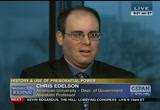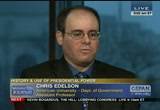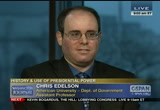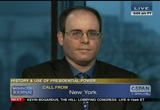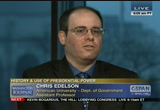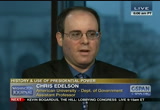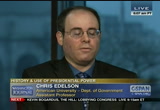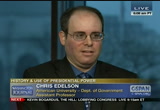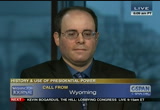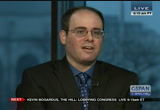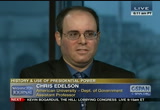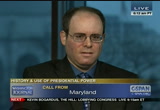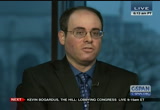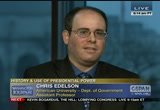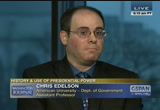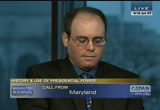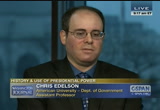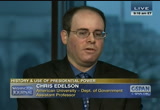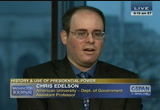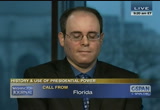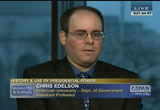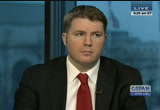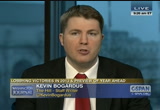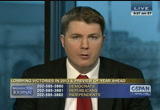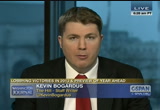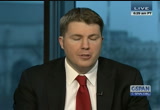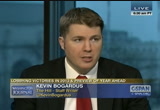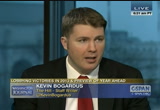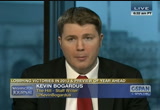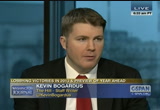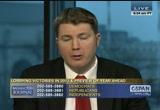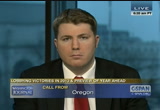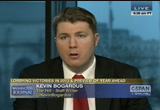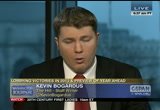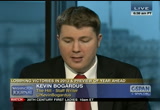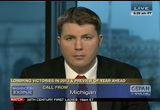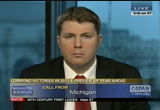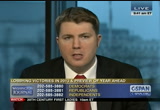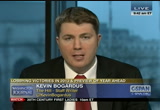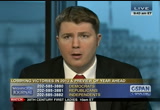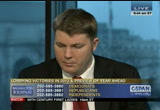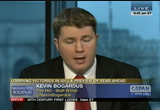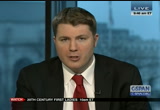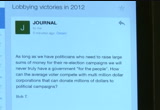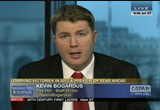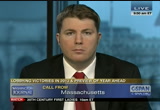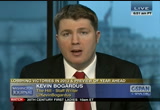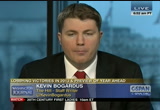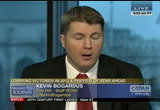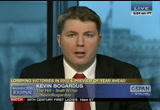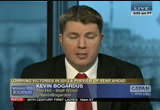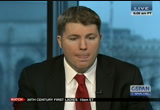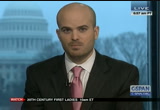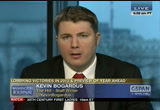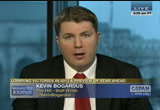tv Washington Journal CSPAN January 2, 2014 7:00am-10:01am EST
7:00 am
discussess edelson his new book. bd at 9:15 a.m., kevin ♪ good morning. talkday's show, we will about the top lobbying victories of 2013. look at the prospects for major immigration reform and discuss a new book about emerging presidential powers. first, the outset of the new year is a time when americans evaluate financial goals. we want to hear about your expectations for retirement. specifically, do you think you will be able to retire on time? how have your expectations changed in the past several years? we set up our phone lines
7:01 am
differently today. if you are under 30 and want to talk about your retirement planning,, number on your screen. or 51 and31-50, over, there are numbers for you as well. on can also catch up with us all of your favorite social media pages. use twitter, facebook, or e-mail us. very good thursday morning to you. we want to begin with the story that was in several papers this week. the headline is the world braces for retirement crisis. is bearing down on workers of all ages. it was spawned years before the great recession. the crisis was significantly worsened i twin traumas. the ap blames the crisis on three factors. one, countries of slashing
7:02 am
benefits. two, companies having eliminated pension plans. they cost employees nothing. three, individuals spend freely. saw failed to save and their wealth disappear. story from ap december 30. several papers were asking our viewers, will you be able to retire on time? the conversation is already happening on our facebook page. in order to retire, first you need to locate an actual job. barbara writes in that i am retiring at 62. it will simplify my life. i have no bills. i am not getting anywhere working and i make the same amount as 1999. get off the treadmill. jason writes in with his advice.
7:03 am
i keep telling people that retirement is more than just not working anymore. you need something to keep the income coming in. no one seems to listen. they blame the state, the fed, obama. to them, i say, i live in america too. i did not set back blaming. that is the conversation on facebook this morning. we will be talking to you in this first 45 minutes on the subject. before we open up the phone mind, let's bring in diane. she is the executive director of the national institute on retirement. good morning to you. thank you for joining us. ,e had a report from last year retirement savings crisis. is it worse than we think? what are some of the measures and what is the state for americans today?
7:04 am
guest: when you look at all working households a new look at what the retirement savings is, you really start to realize that we have virtually nothing saved. has aboute household $3000 put away in retirement accounts dedicated to that purpose. if we look at the population in 10 years, the traditional retirement age, those individuals have about $12,000. a lot of that comes from the fact that we also know that we have 30 million working age households that actually have no retirement savings at all. a lot of that comes from the fact that we are at a point where 52% of working households have access to a retirement plan is sponsored by their employer today. host: some of the charts from your recent report -- 45% of all
7:05 am
households own assets in a retirement account. you can see that change over the course of different ages. the gap in retirement savings. the savings gap as it is described. guest: what is suppressing to us is that we hear so much that the budget deficit in the budget gap. when we look at some of the numbers, if we look at what people have in retirement there are $14 trillion in terms of where we should be and what they should be put away. on target,t to be they need to maintain their current standard of living. about $14this is trillion. if you start to look at other assets that they have, including the house, that cap comes down a bit.
7:06 am
$6.8 trillion.t still, those are huge numbers. the other piece is what american should be saving. hopefully you will replace the income that you are no longer earning. look at how much people have saved, with regard to their current level of income, we were surprised by the working one times that have their salary or less saved. you look at the group that is oh -- close to retirement, almost two thirds are in that situation. ify really need to do more they are to maintain their standard of living. diane, you talked about being on target. what is the target these days? doesn't look like 70 is the new retirement age?
7:07 am
i think that people are still trying to figure out exactly where this all sorts out. social security is raising the normal retirement age. people -- there 39% ofecent survey where the people talked about continuing to work and never retiring. what we find is that when you start to talk to retirees, you get a strong sense of what people thought it would work longer. if something happens late in job, life, they lose their all of a sudden retirement becomes a reality. they have not planned for it. with the national institute on retirement security. if you want to see their work,
7:08 am
the website is nrif.com. thank you for getting up with us. she referenced the wells fargo retirement survey. some numbers from that -- 34% of middle-class say that they will work until their 80. they will not have enough money for retirement. that is up from 30% in 2012. say paying bills and saving for retirement is just not possible. we're talking about retirement and your plans. we want to hear from you this morning on washington neuronal. full lives are open. -- phone lines are open. the numbers are underscoring.
7:09 am
on the line for 51 it over is bruce. good morning. caller: thank you very much. happy new year. to point outing some things that bother me. the people that take care of themselves are the ones that end up unpunished. have cash in the bank and saved diligently get no interest. there are problems that the government has caused. people retire -- leaned too much on social security. it was never meant to retire you. it was never meant to take care of all of your bills. the politicians have failed. they have failed miserably to adjust the retirement age. they should send retired people the same form that they send you while you are paying inward.
7:10 am
so much is gone the social security. -- they should reverse the process. host: you say they have failed to adjust their terminate. what do you think the rage should be? caller: i do not know that the politician should be involved. safety net have a for people who are in need, not people who sit there and think that at 65 day retirement and the government should take care of them. host: cw is in liberty, texas. 31-50. thank you for calling. caller: my opinion is this. i accepted the fact that i will have to work until a dad i. that is ok. if you get up early and got a bit late, you can be somebody in america. i am starting to make that that no longer works.
7:11 am
if the government wants you to be like a baby bird, then the mama bird regurgitates money into your mouth. we need skilled labor. when a large scale projects. when you get this under control. the old recipe of success will work for it you can get up early and go to bed late. host: cw is calling in from texas. the conversation is continuing on facebook. a few tweets are coming in. gary says i will retire the day i can afford to. i simply hope it is not one day before my death. we will be talking about this for a half-hour or so. we are showing you updates from news around the country. one more chart.
7:12 am
this is from a washington post story last year. the percentage of households unable to maintain their free retirement standard of living. you can see that number is creeping up over the years. 53% of households are at risk of being unable to maintain their preretirement standard of living. louisiana next from on the line for 51 and over. good morning. caller: i guess i am an auto tea. -- oddity. i spent 45 minutes in the business of flying airplanes. both for the military and commercial aviation. i kept my eye on the ball. i started working on my retirement and never looked beyond my means. father taught me important lessons. if you cannot afford it, do not buy.
7:13 am
i never lived the lifestyle the rich and famous. i was frugal. when i retired, i owned everything. whatever i get each month is what i can spend. just to enjoy maritime and. my lifestyle is no different now than it was 40 years ago. it is a matter of personal responsibility. a matter of planning ahead. there will be hiccups in the road. there were in 1981. when i bought a house, i paid 16.5% interest. people complain today because they do not have money. interest rates do not give sympathy. you cannot spend more money than you have and expect to have anything left over. host: can i ask you, what impact did the recession have on your say yount plan? you
7:14 am
have to plan ahead, could you plan for an event like that? caller: yes. they, the great recession. in 1981, interest rates were 16%. i had three mortgages. i had to get out from under them and i did. the way i did it, i denied myself a new carpet i didn't go on expensive vacations. we ate frugally. we paid everything off. from what i went through in 1981, it was more than what we got right now. was raised by parents that were married in the great depression. they did not have any kids until 11 years after. they could not afford it. it was not much. they lived within their means. i think about three new cars in my life.
7:15 am
i keep them until i can afford a new car. i do not live beyond my means. that has a lot to do with it. there are a lot of tough things going on right now. the people have been losing jobs for years. how did people get through the great depression the 1930's? think that it is an issue of personal responsibility and not living beyond your means. host: john, i appreciate you calling in. a few more comments from twitter. someone writes an, are you serious? every generation is working harder and longer for less value. --ew comments from facebook i am not sure i want to retire says cameron. aire for living and want to continue to do so. it wrightson and says
7:16 am
depends whether government gets involved in my life. thomas is on the line for those 31-50 years old. good morning. caller: good morning. host: turned on the tv and go ahead. my thing is, basically, i was forced to retire. i retired early. i was trying to prepare -- you do not have a chance to prepare like you would hope you would. inot of people are calling with dependent on the government. we have a dysfunctional government. the cost of living has not risen.
7:17 am
that is my point. these people in the republican party should be held accountable. everyone.ts older or younger. host: that is thomas from alabama. vero beach, florida is on the line for 51 and over. good morning. do you think you'll be able to retire on time? my retirement age is iing to be a -- based on what have to do to pay my way. as john was talking about, be responsible. i have something to say to john. block, blah, blah.
7:18 am
i have heard that forever. working until be i am 70 or until the day i die. whichever comes first. the comment i said is that things along the way change. i am 57. hr made this whole process so complicated. it is so bizarre. i went to work for dot coms back in the 90's. the first one i went to, i went to the ipo. i never saw a dime. i was never able to cash in because the process was so overarching. same thing on another one. i was laid off on the first one. things along the way where business.
7:19 am
john did his whole lifestyle and have the thing where you can work to retirement. he might have lived better than he said. he said he had three mortgages at one point. i know how that system works. people were leveraging all kinds of things. maybe what he said was true. i worked in finance at the time. leveraging right and left. corporations have shifted. host: two you think there is a risk between generations? are workingle who now and people who are at the age of retirement? caller: host: big-time. i live in vero beach and we are a retirement capital. it used to be st. petersburg. we are big-time. hereoney that comes down is money that is from -- i am
7:20 am
from florida. born and raised. state taxes in different things that were in place up north enables people to save and have pensions and retirement accounts. it was much different than the south. ating that same time, i am the trailing end of the baby boom generation. awayhole thing shifted from any benefit to myself. i had two strikes against me. and the sameorida situations along the way -- host: thank you for calling in. that ap story that we talked about -- it talks about the brief golden age of retirement. the age came to an end in 21st century.
7:21 am
recently, aarp's president was at a congressional hearing. he was asked about the retirement question. he was asked whether it causes a rift between generations. here's what he had to say. [video clip] >> i think that the issue is that that is a false premise. it says we have a finite amount of resources. we have to fight over them. the issue is, we all age. when you're 20 and you enter the workforce, you have a long life of retirement. if you look at the intergenerational activity, you are concerned about your life and your family. notion is not one of intergenerational conflict. it should be intergenerational solidarity. we look at the data and it does not transfer well from old to young. it is different. bottom to top.
7:22 am
we have seen the most massive redistribution over the last 30 years. this is a false premise. we're all together and we care for our children. we do know one our parents to be burdened. as grandparents, we do not want our children to be burdened. when you look at the dynamics of family, protecting the workers, we have an idea based on social endurance. we're all in this together. we all contribute and we take the benefits as appropriately. they're are designed to protect us all. that was aarp's president. he was talking at a congressional hearing. we're talking to you about whether you'll be able to retire on time. the phone lines are open. the numbers are on your screen.
7:23 am
the foam ones are open. will you be some news from around the country today. here's the front page of the denver post. the marijuana milestone in colorado. historic day. smiling wide in the rollout of recreational pot. high fives all around is the headline. the front page of the new york times today notes the bill de blasio being sworn in as mayor of new york. his familyf him with as he is sworn in at city hall by bill clinton. it notes that in his inaugural address, he described social inequality is a quiet crisis.
7:24 am
the driveways and terrorist attacks -- the income disparity is a struggle. than he is the first liberal to lead city hall in two decades. he delivered his critique as his bloomberg, seems to embody the current gilded age. he sat unsmiling a few fleet away. of the new york times. we also want to point out the lead editorial. it has to do with an estate leaker edward snowden. the editorial board of the new york times dubbed him a whistleblower. it says that the enormous valuation of the statements revealed and the abuses he has revealed -- he deserves better than a life of permanent exile. he may have committed a crime,
7:25 am
but he has done the country a great service. it is time for us to offer him a plea bargain or some sort of sentencing and will allow him to return home. he should have the hope of a life advocating for greater privacy. that is the lead editorial in today's new york times. asked you this morning whether you think you'll retire on time. how has the economic situation of the past several years impacted your retirement plans? patricia is waiting in pinellas park, florida. good morning. caller: good morning. i wouldlike to say that like to see baby boomers retiring on time. that at my age, i will retire on time.
7:26 am
baby boomers are still out there. they are getting into their senior citizen dazed. even way past their ages, they are making it stagnant for people who are graduating out of college. i feel that the technology though we are learning is way above the baby boomers. we clearly were more educated. not going to get the opportunity because of the baby boomers. they will retire. i would like to see them retire so we have the chance to work. we could make the country better. host: patricia calling from florida. peg writes in on twitter that
7:27 am
retirees lost 30% of their 401(k)s. the best of planning could not avoid the wall street crash. we're talking about how your retirement plans were active over the past several years. steve is in boise, idaho. on the line for folks under 30. good morning. how have your plans changed in recent years? me, the whole thing is i will not be able to retire on time. there will not be anything to retire with. social security is not designed cover everything. it is an important part of it. isy're saying now that it 2036 that the trust fund will run out. 75%fits will be reduced to of what they are now. they're not all that great now. bothers me the most is that this is fixable. there are half a dozen options for fixing the system.
7:28 am
revising the cpi -- increasing the cap. earnings can be capped. increasing the tax rate and a bunch of others. no politician will touch it. they are too gutless. they're more afraid of losing an election than they are of people losing their social security. host: what does this mean to you? what are you hoping to retire? caller: i am 27. i have no idea what age i will be able to retire. there are too many unknowns in the system. guess i am a pessimistic personality. you better plan on working until you drop. right, a lot of older folks have said smart things about not living beyond your means. when the head when you can. ahead when you can.
7:29 am
i cannot look that far down the road. mention that politicians are too afraid to address these issues. is there any politician that you think is staying the right things? caller: not an active all addition, but bill bradley from new jersey. i have heard him speak a number of times on this topic. he is one guy. he does seem to be in touch. maybe there are others out there. i do not think there are any that are jumping up and grabbing a megaphone. host: steve. we have set up the phone lines by age group. we're taking your calls on this question. do you think you will retire on time? there are stories in the various papers. the hill newspaper had a story up today on white house
7:30 am
increasing pressure for the passage of jobless age. it notes increased pressure on congress to extend long-term jobless aid. gene sperling is the director of the national economic council likelys that there is less joy and more fear and distress and the homes of 1.3 million americans who have seen their unemployment insurance cut off. that is a statement released on wednesday. also, this from the washington post. pay raiseautomatic for federal employees in three years kicks in on wednesday. the rates are increased by one percent for the next applicable pay. period. orderent obama issued the before christmas. by law, congress can block increases.
7:31 am
lawmakers passed on that opportunity to do so. if you want to read more on that pay raise, that is in the federal page of the washington post. steve is up next from california. on the line for folks 51 or older. good morning to you. caller: good morning. the guy who was just on hit it right on the head. i have helped to raise six kids. it will be tough for them. i am retired. social security is not going to be enough for people. they will have to augment that with something. -- the guy from louisiana talked about it. live within your means. all of these other platitudes. that i knew growing up,
7:32 am
argonne. the high-paying jobs that we had argonne. -- are gone. our kids will not have that. the housing interest is low but that will go back up. how can you buy a home now at $10 per hour? i feel sorry for people now. host: what age are you shooting for for retirement? do you think you'll be able to? caller: i am already retired. host: did your plans change since 2008? caller: no, it did not. people wondered why meg whitman had trouble in california. she came out here and attacked our union. california's 55% union.
7:33 am
here she is complaining about union retirement. she was going to lose. i retired on a union retirement. i do not make a whole lot of money like they do now. i make enough to survive. people now are depending on social security and they are in trouble. host: thank you for calling in. a few more comments from our facebook page. people are working longer. in the corporations are willing to keep people to the age of 70? at that age, productivity will drop. on twitter says that one of the problems is when you get to be a certain age. they will lay you off. have 10 or 15 minutes left to
7:34 am
discuss the subject. that discussion is also taking place on twitter. in pennsylvania. on the line for those 31-50. caller: i would like to answer that question. absolutely. thatld just like to say you need time. time is a good acronym. that is all we need. generation is in the workforce now. we make $10 per hour. that is not enough. we have to be innovative and find new ways to get our workers into the workforce. learn trades. multitasking network and do different things. issueis it an educational
7:35 am
that will help people get into these jobs? caller: absolutely. we're all educated. to get the time that we need, weighted energy and tools. if everyone could get more of that, we would get further ahead. we need different ways to think outside the box. we should allow our younger workers to see the older workers and experience. i feel very fortunate to be from my state of pennsylvania. our workforce is very thorough. it is very broad. we are innovative and our country needs to follow examples from other leaders. not just from pennsylvania. we need to come together and find solutions. that is important. host: dan is calling in from pennsylvania.
7:36 am
we have a line for those who are under 30. looking ahead to retirement. andrew is on the line from alexandria, virginia. think of her calling. that the think question for people of my generation is do you think you can retire? never mind on time. i think the on-time question would be for my parents. think about the generation gap. the opportunity to go to private colleges or universities. that is roughly $3000 per year. our generation is looking at $30,000 per year to go to these institutions. the way things are going, hopefully it will collapse. threel look at roughly hundred thousand dollars per year to send our kids to college. that is not feasible. our generationh looking to retire is that we are starting way far behind where our parents started. we have six figures in debt.
7:37 am
we have our first jobs and we are renting. it looks like we will run until we die. no one can afford a home. i think that, fundamentally, people in my generation are hoping that our parents will have enough money left over to save and send retirement. it is not feasible. i 55.not retire at all it is not looking like it will happen. host: andrew in virginia. a couple of other end of the year stories for you today. this is the l.a. times. noting that the alabama republican, jeff sessions, is the senate top talker. ion of loggingnct
7:38 am
the most hours. he spoke for more than 33 hours this year. that is slightly more than harry reid, who clocked in at 30 hours. the l.a. times notes that ted in at 20ally came hours of speaking time. he occasionally deferred the floor to a supportive colleague during his qualify filibuster. that cut down on his for speaking time. one story from politico talks about the 14 dates to watch in 2014. , january politically 28, the state of the union. march 11,ppening on the meeting to fill the seat left by bill young of florida.
7:39 am
willspecial election create an immense amount of interest. the mid-june supreme court rulings will also be a day to watch. we have a few minutes to talk to you about this question. will you retire on time? have your plans changed? on the lineouisiana for folks 51 and over. caller: good morning. host: go ahead. caller: i am able to retire at 54. i worked all of my life in the with anna. people probably have a different work ethic. make a living one way or another. fortunate to -- i was to go to work for an oil company. i saved my money and retire. i have sons.
7:40 am
it is hard to convince them to take the job. taxation is killing us. host: thank you for the call. i feel like taxation now is the biggest inhibitor to all of our growth. it is a killer. i am able to save my money, tax-free. that enables me to retire. the taxation is very hard. especially when you start to look at property taxes. all of these fees and things that go on the states. we are taxed to death. ruskin,ve is in florida. on the line for folks 31-50. good morning. caller: i am along the same lines as the previous caller. if we did not have to send such a big piece of our income to the irs, individuals could invest
7:41 am
that money instead of sending it to the irs. if we could invest that, that would really make a difference. host: do you think that people would invest the? would they use that to spend? caller: that is a good point. they should invest it. that is where freedom comes in. but really, i wish we did not have to send such -- i am already thinking about what my payment will be. i am already trying to get my paperwork together. did your plan for retirement change over the past several years? caller: not really. now, not putting a lot
7:42 am
back toward retirement at all. the irs will get theirs. you can believe that. host: thank you for the call. tom is in baltimore, maryland. on the line for folks under 30. good morning. caller: i am actually 30 years old. basically i had a 401(k) with a company that i work for for six years. i lost my job. of the little savings that i had. -- anto do in a morgue emergency withdrawal. i am looking at an additional 10% penalty. bills.aying my regular
7:43 am
mainly default thing on $400 per month in student loan payments. toill end up paying close 70% just to pay my bills and survive. there goes my retirement. andi am there it he hopefully will start a new job at the end of january. i can restart my 401(k) savings. my generation is disenfranchised with the whole concept. of puttinghole line money ally and it will be there for tyre meant. -- retirement. these individuals have their you see how quickly this happens.
7:44 am
there needs to be a more secure way to get people to put savings and. i think that they will. trust your money with wall street. to trust that your money will be there. our generation has a lot of issues. hopefully some politicians can come up with some innovative ways to finance that. -- the whole system is a mess. if i do not get a job, i will be penalized. host: tom is in baltimore, maryland. gas, i am on, track to retire on time. i paid for the generation before me. that is the way it works. jacob is in nashville, tennessee. on the line for 51 and over. caller: good morning.
7:45 am
i am 71. do stonework outside. i am still working. i do not feel like i will be able to retire. i would not if i could. i would probably keep working. getdvice to everybody is to hold of a place in florida. possibledo everything to stay healthy. if you stay healthy, you'll find some kind of work great most of the people in this country do not understand true nutrition or how to take care of themselves. in the things are going, capitalistic system, we will have to live with in this. we are destroying the planet. is a survival thing. people need to learn to take care of themselves.
7:46 am
that is the most important thing. i do not think i will ever build to retire. host: that will do it for this segment. before we let you go, two other stories to point out. the health situation of different figures in the news. barbara bush was hospitalized with a respiratory condition. we noted that yesterday. she remains hospitalized with that respiratory issue. her condition has not changed. a spokesman for her husband's she issaid on wednesday, in great spirits. she has already received fantastic care. we will keep you updated if anything changes. one other figure in the news, ariel sharon, the prime minister of israel. he has been comatose and edged
7:47 am
closer to death on wednesday evening. he is suffering from kidney failure. a spokesman for the hospital has said that there is a deterioration in his medical condition. that story is in the new york times. that is it for this segment. discuss thewill outlook for immigration reform in 2014 with alan gomez. ther, we will discuss history of emergency presidential powers with an author. we will be right back. ♪ >> we are in the gallery of the
7:48 am
light catcher building. we're looking at vanishing ice. alpine and polar landscapes and art. the expedition is to highlight the rich cultural heritage of the planets frozen frontiers. the alpine regions and the antic -- arctic and antarctica. this is the agreement ar -- ice sheet. it is exhibited side-by-side -- easthotograph of greenland. it is from the last iceberg series of 2006. many people understand the importance of ice for the planet. it's reflective qualities that help to regulate the quiet -- climate.
7:49 am
unaware thatre there is a collective consciousness and western culture about these regions. so, it was important within the context of climate change to let people know that these regions are fundamental to our identity. >> there's more from the museum this weekend is booked to be an american history tv look at the history and that are a life of bellingham, washington. that is sunday at 5:00. 10 or 15 years ago, we started looking at census department data. something very strange popped out. when you look at where the --fits are, you see a map germany, ireland, france -- when you look at where the profits are, italy, france, germany, ireland. there is a disproportionate
7:50 am
amount of profit and ireland. that was one indication that something was going on. >> more with marty sullivan, a chief economist. a provider of global analysis on sunday night at 8:00. journal"ngton continues. host: in usa today, alan gomez joins us to discuss congressional action on immigration reform in 2014. we're are having a midterm election year. how is that going to impact the prospect for a big new immigration form? caller: they will have to do this relatively quickly. the closer we get to an election, the more difficult it becomes for members of the house and senate were facing close elections to want to take up this controversial issue. what we have now is -- there is
7:51 am
some time early in the year. there is another window that they're looking at after the primaries. one of the big concerns here is that republicans who are not voting any thing might face a primary. there are these windows throughout the year. everyone agrees that when it gets too close to the election, it will be impossible. host: here's the story from earlier. the budget deal may clear the deck. take us through what will happen when congress returns. guest: what is going on is that speaker boehner -- basically, the senate has passed immigration bill. everyone is waiting for the house. the house has not done anything. they have not taken action on immigration. they have passed a few bills through committees earlier in the year. everyone is waiting on house.
7:52 am
you have speaker boehner and republican leadership developing principles. this is what they want to see. they're proceeding with smaller bills. they will go out there and they might file that isabel. they will take it from there. they have done issues on border security and illegal immigration and how to bring in more workers. thing we have not seen from them in when everyone is waiting for is how they will handle 12 million undocumented immigrants living in the country. this would give them citizenship. apply for citizenship after 13 years. the house is more hesitant. we are saying a lot -- that's what we're seeing now. accessance between some and some who just want to
7:53 am
legalize them. some do no one any legal status whatsoever. host: you brought up a large bill that was brought up last year. here's the lead story of the new york times. -- said tos that the back change on immigration. they're saying that the speaker is committed to a step-by-step move to revise immigration. talk about why the difference and the step-by-step approach. guest: the big concern these days is the bills that you can start throwing things into. ist the house has been doing exactly what the senate did. they passed this gigantic though. they're shoring up the southwest border. for jobs, they are required to check immigration status. they're expanding the legal immigration systems.
7:54 am
also the big complement of the pathway to citizenship. the house has been very resistant. even the senate supporters have embraces the rubio idea of what the house is doing. they want to take it step-by-step. they can control it better and manage this. is they havee done passed three different bills. some on border security, some interior -- also some smaller bills. they're bringing those in the country. they think they can manage things better that way. things have spun out of control. they are especially worried about passing a big hill and then going into a conference committee and then who knows what comes out of that. that is the resistance right now.
7:55 am
even if they end up passing smaller bills, you still end up with a lot of components. it is just a matter of how you approach it. we're talking to alan gomez. if you want to ask him questions or offer your comments, we're talking about the prospects for immigration reform. the phone lines are open. numbers are on your screen. while folks are calling in, we want to talk to you about the signals that speaker boehner is sending. about thebeen made hiring of rebecca tallon. who is she? guest: she is from the bipartisan policy center. she worked with senator john mccain.
7:56 am
she is a veteran of these immigration fights. effect -- the fact that he has brought in this person to lead this of is a clear signal about his intentions. he really wants to continue pushing forward. you can look at the fact that the house has not passed anything. they have not considered an immigration bill. they have not filed a bill. to think that there is nothing going on there -- they see that hiring and they see that john boehner has spoken about the fact that he wants this to be a priority. he was immigration reform to happen. he put those together and that has caused celebration. at least optimism. speaker, works for the that she has written about how she thinks immigration reform could work. what has she said before?
7:57 am
with: it has a lot to do bill is007 immigration an indication. she was working for john mccain. a lot of those components ever similar to what the senate passed last year. security issues was far beyond what they would've gone with. of allowing for these undocumented immigrants to go through this rigorous process. they're becoming green card recipients and then citizens. they're having a pathway opened. it is combined with these border security controls. that combination and balance of bringing together and giving republicans with they want. it is the type border and a final lockdown. we have been promised this for decades. outould bring the balance
7:58 am
so that those who are here should have a path to citizenship. if they have a clean criminal record and all that stuff. alan gomez, the numbers are on your screen. alan gomez is with usa today. you can follow his work on twitter. some of the ideas of when a speaker boehner could move some of this. do republicans want to see this before the primary season or do they want to see it after? guest: it depends which republican you ask. when this whole thing got started, it was one year ago. it was after the 2012 elections. when mitt romney got 27% of the hispanic vote. the party elders saw that and said we cannot continue to compete on a national level if
7:59 am
we only get 27% of the ever increasing vote. host: a lot was made of that. guest: exactly. that as onen view of the things that hurt them. that was one of the things they needed to turn around. for them, that is why you saw the senate pick it up. they really were pushing for some sort of immigration reform. they do not inc. that passing immigration reform will win them over the hispanic vote. to get them to have a conversation with hispanic voters -- if you are seen as too anti-immigrant, it blocks them from being able to discuss these issues. so, you have this national perspective. there's the idea that they want to get something done. theou're a house member, people that, you're saying we do
8:00 am
not see a need for some like that. status of the national party does not matter as much. host: should republicans make more of a statement? could take on some of these voices in different parts of their party. from the party perspective as a whole, a lot of them will be very happy with that. forget the primaries, we are not worried about the elections and things like that, which i realized how ridiculous that sounds right when i set it. but, they could make the argument they are pushing for this and are actually taking action on it. if you are one of these many house republicans, they do not have hispanic populations in the district, and they have a very real threat of being primary on the right if they even so much about a supportively
8:01 am
path to citizenship. many of them speak about it as amnesty. when did primary season and and when is the window? between march and may is when you see some of your vigor states. a lot of republicans there are very active. the tea party base is very active in texas. a lot of concern is right there. in may, you have a lot of other bigger states vanished with their primaries. immediately after that, you have a window there for a couple of months here at late spring as we get into summer. after that, we are looking at after the election. host: on twitter -- guest: how much time do we have? .e have not secured our borders
8:02 am
we have people coming over from central and south america. what they have been doing, this is one of the areas where the obama administration has walked a fine line where they are trying to can't and you a steady and strong pace of deportation. people are here illegally, and then return them to the country. on the other hand, most of the supporters are calling on him to actually help those people. -- those deportations. it is difficult. on the border, it is chaotic still. pretty wide open. the senate passed a border for 20,000 more border agents to flood that region and lock it down. i visited the border quite a bit folks thered heard say more agents is not the answer. fullyhey are not
8:03 am
supportive of it. the house has taken a different approach where they want to start measuring it better and take a more analytical approach better and identify more trouble spots and that is where you focus your resources. there are different ways to get there and everybody agrees the border is not secure and it still has -- they need to figure out someway way to finally get it there before they can convince enough republicans to get on board. is in virginia on our line for democrats. good morning. caller: good morning. i think things could happen that could benefit america, i guess, understand i immigration has got to give the employer 24 hour notice before they come in to inspect and see if they have got any illegal
8:04 am
immigrants working. i would suggest giving jail time to the amp lawyers -- employers if they are caught. got for bid putting job creators in jail. forbid putting job creators in jail. guest: we have seen a very different approach under president obama and president bush. prez obama's focus on worksite raids. we saw a huge raise of per -- poultry lance where they would come in and round up a lot of employees there, but then the owners, itith the was not the focus really. rounding up the workers and going at it that way. what the obama administration numberthey increased the of audits on worksite on
8:05 am
companies. they have been not completely changing the focus but have been more focused on these employers. they say if you cut off the job and make it so employers understand their really will be a penalty and something to pay for bringing in a lot of illegal workers, that would attract them and stop them from hiring these illegal immigrants and reduce the magnitude of jobs to get here. at the same time, you balance that out by going after undocumented immigrants scattered around the country. but those are very different approaches. >> on the audit issue, did the senate will change the approach? it does not change the approach. think most people in washington now are looking at is expanding this program called e- verify. used by quite a few employers in the country and the federal government. does is when you go
8:06 am
live for a job, they will not just do a criminal background check on you as they do now. they will also do and immigration check on you and run your information through federal databases to check what your immigration status is. it is an optional thing right now. some states started requiring some employers to use that. under the senate version of the bill, every employer in the country will be required to use that in five years. in the house, it is one of the bills they pass through their committees, requiring the program to go nationwide. as one of the things we talked about when you are allowing people to become citizens with a program like this, to pacify folks focused on the enforcement aspect of this. in kansas on our line for republicans. good morning. caller: gentlemen, i think this is not an issue at all. i believe we have plenty of laws that need to be
8:07 am
addressed and fully. i do not think republicans are going to back down one bit. i do not believe we have seen john boehner or anybody else in the senate back down and i do not think you will see it now the republicans have to change america because the democrats have had a go at it and have i have had my whole social security number given to me by a man in india. i will be 85 next year. maybe next month. working. get on the ball. do not just sit there on your rear and do nothing. >> one of the main criticisms of the president has been he has not been enforcing laws when it
8:08 am
comes to immigration enforcement. his administration each year has 100,000rted on average deaths reported on average 100,000 undocumented immigrants. it has gone down. one of the things the president has done over the last years is insulate a couple of different groups from deportation. we saw a couple of years ago when his administration issued a program, deferred action. undocumented immigrants who were brought to this country as children. -- he started a new program where these kids could apply to the federal government and they would have their deportation deferred. than 400,000 undocumented immigrants who fall in the category have been approved for the program. that is one big chunk. the argument is these kids have done
8:09 am
nothing wrong. it was not their decision. why should they face the threat? months ago, these administrations formalized a program where if you are serving in the military, you do not have to worry about your immediate relatives being deported. they become safe from deportation. on the one hand, they see these moves and worry about a slippery slope and worry about obama expanding undocumented immigrants, but on the other hand, the administration is saying, we are deporting enough people. on folks with criminal backgrounds that have records. they do not want to waste the limited money they have to go after people and deport them on people who came here as kids. host: she does not think republicans will back down. other leading players on the republican side besides boehner? guest: it is all the republican
8:10 am
leadership. paul ryan is an important player. he will be working this behind the scenes. it has been a big issue for him. he has been busy with the budget, but he has been a tokroom player pushing this some degree. to what degree, we are waiting to see still. eric cantor has spoken openly about the fact he is working on the representative who chairs the house judiciary committee. they are working on a bill to address those young undocumented immigrants. you run down the line. a representative out of california has been talking about finding the middle ground allowing for all undocumented get -- immigrants to citizenship and treating each group differently. he wants to give some to some and allow for citizenship for others. we are talking about all of the republican leadership and they are all involved in the issue.
8:11 am
we are waiting to see what they end up doing with it. >> a comment from twitter. -- one other tweet -- calling in from alaska this morning is byron on our line for independents. caller: good morning. how are you folks doing this morning you go -- morning? i listened to the people talk about immigration for years. i am 62 years old and born and raised in alaska. then fathern my side. one of the most interesting things that came to my attention madehe so-called agreement
8:12 am
between the united states government and the people of alaska back in 1950. public law, 85 508. an agreement made between all branches of the government, local, state, and federal. recently at our alaska federation convention, i'm sure mr. gomez probably heard about alaska is a part of the immigration reform bill. the interesting thing is, as i stated earlier, i was born and raised here in alaska. there were immigrants in this state before the state became a state area there were chinese russian,ipinos, german, mexican, all kinds of immigrants. today, this is the only state i
8:13 am
know of that gives out free dividends to the people providing they reside here in alaska for a certain time. if you are to leave alaska, for will no reason, you longer receive this give a dent. the amounts are anywhere from 800 to $1000 every october. hispanics come up here working and processing plants and working in restaurants, entrepreneurs, you know, we are in the 21st century now. i filed suit against the state of alaska recently, asking them, why are you not in compliance with an agreement that was made in 1958? president obama sent me a letter informing me all states in the united states have to comply by set of rules.-- my documentation, my question to
8:14 am
congress, was such an agreement made to all states in the united states? do you know about this agreement? guest: i do not know the specifics of that law but he raises a good point. the relationship between the federal government and how individual states camel image -- handle immigration, that has been much debated and much legislated. the most notable of which, arizona, in 2010, they passed a bill to really crack down on undocumented immigration in the state. wave ofked off a several states passing cymer laws and prompted justice department as well as a lot of immigration groups to sue the state and ultimately ended up here before the supreme court, where the court ruled immigration enforcement is, for the most part, solely within the responsibility of the federal government. we have had the battle for years now.
8:15 am
the federal government, that is their responsibility. they can help but cannot adopt their own immigration scheme and try to carry it out. >> news on state action. this is from earlier in the week, noting today in nevada, immigrants living in the united canes without permission apply for authorization cards. that is starting the day the state is anticipating tens of thousands of people will apply under the program. our linen georgia, on for democrats, earl, good morning. good morning. but istate, a red streak, am a democrat all my life. i have been in the labor union. i see different places, new york, l.a., boston and las vegas. hand on the have a immigration promised because they had strong unions there.
8:16 am
that i hopeas it they do not do anything because all we will hear about is them getting reelected and i am hoping they will make a big change and then we will get something done. that is my comment. thank you. guest: one of the interesting things about the debate this year is that unions during previous immigration debates at best. on the fence they have proposed some of these before. some of these attempts to legalize the population in the past. but you have seen most of the major unions getting on board this year. thatbalance out the idea yes, there will be a lot more workers competing against union members for jobs. at the same time, there is a realization there are a lot of people out there who could end up joining care that has been one of the interesting parts of
8:17 am
this year's today that is different from before. host: we are talking to alan today immigration reporter. bill king writes in on twitter -- let's go to joe now in pennsylvania on our line for independents. good morning. me,er: i wanted to say, to immigration is the big issue. i do not care if it is state and local government, federal. i followed these politicians and how they will vote. i will not vote for anybody that agrees with immigration, illegal immigration. we need immigration reform, but not illegal.
8:18 am
they would cut off all of these were most of these benefits. do not even have to act like they are stupid. they do not have to round them up. cut all of this off and people will go back by themselves. come over here legally. >> he said we need immigration reform, but not illegal immigration. what parts of immigration reform? the thing about illegal immigration is, if they were to go on the back of the line, they will get a fine. all of our flights would be $15. these people are poor to begin with and cannot afford that. most of the stuff with the politicians to make, they say they build the consensus a long time ago when the money was allocated. they could have solved this problem a while ago. maybe a fansy,
8:19 am
will be built and maybe it will not. it is a political thing. it, youcomes down to cannot believe any of the politicians will follow through. that concerned, anybody in d.c. involved with this will say nobody is for illegal immigration. the bigaces what is issue here, which is what to do with the undocumented population. you can see right there he does not want to see them rounded up and deported. i do not even know how conceivably you can get 12 million people and take them out of the country like that. you raised another point i want to address. going back to the border security issue, i have been down there a few times and have seen very different parts of the fence and different trains. we go to california and you have got a triple fence constantly patrolled area because you have san diego right there. dmz zone.
8:20 am
like that, its works and has been proven to cut down illegal immigration. you start get into these mountainous regions and new arizona,swer texas and the fence there has a limited capability. the joke is if you build a 12 foot fence could they will build a 13 foot ladder. you see where they created doors and swing open tonight and bring people and contraband in. they use catapults to put things over the fence and the o'connells under the fence. a fence in and of itself will not in any way stop those people coming over. it is finding the balance between a fence in certain places and technology like radar's and sensors. they started employing drones to monitor people out there and the right amount of manpower to be able to react to hotspots and where people are making the crossing. of the most
8:21 am
interesting parts of the debate. it is really tough. >>, times have you been to the southwest border? >> several times. seeing the different regions, you talk to the sheriffs down there and it is funny hearing them when they talk about when folks come down from washington and getng eyes light up an understanding of the size and scope of it. that one of the most surprising things for you going down there? guest: yes. it is one thing to go then be done with it, but when you look at a place like mexico and arizona where it is nothing but if theynd a fence, even start cutting down the fence, how will you get to those guys? how will you get to them and respond to them and stop it you -- it?
8:22 am
i hear for this quite a bit. look at israel. not a lot of people cross over the wall. it is not a 2000 mile wall. the crossing from southeast texas to western california is incredibly large. you have the oceans where they are coming around on both sides. locknormity of trying to that down is incredibly difficult. it is one of those things they need to spend more time figuring out that strategy on how to finally do that. robert is in maryland on our line for democrats. caller: good morning. i am thinking like this. help me if i'm wrong. these immigrants do not make much money. they still pay federal taxes and still use our health care system. get from them help social security and some of our
8:23 am
expenses. the obama health care bill will cut down the cost of these people being here as far as oneys are concerned. we have to incorporate them. let's go ahead and incorporate people. and no american wants to go out and pick crops for 5000 or $6,000 an hour. some of them become entrepreneurs and like all of us, we are all immigrants here. i am thinking, let's try to make use of their abilities and what they have to offer america. guest: the economic impact of legalizing undocumented immigrants has been very controversial debate. for years now. in 2007, the last time congress really made a good attempt at
8:24 am
reforming immigration laws, the heritage foundation, a conservative group in washington, came out with a study that said it would be a huge financial drain on the country, because of how much they would take on medical benefits going to schools and using our roads, that the drain it would have on the economy would be bad. i have heard opposite for more traditional liberal groups arguing that the amount of money -- a lot ofh taxes them do pay taxes -- we only have an image of field workers -- but they do pay into social security. right now, they will never be able to assess. they do pay medicare system. year, the congressional budget office weighed in on the senate bill and found over the long-term and short-term, it
8:25 am
would be how much they're paying in the system and taxes, and if they are all fully legalized, how much all of them would be paying in taxes would be far in debt far outweigh it. been able toave hold onto that and say, this is also an economic argument we are making. it has been something that really changed the debate. impact oned about the the republican party and republican politics. talk about the democratic side. do they risk a pushback from the latino community if they do not move immigration reform in 2014 after promises and comments about this from the president on down? absolutely. one thing to say you want to push on this. democrats have been pushing on this kind of bill for many
8:26 am
years. the fact we are getting so close and the fact it passed the senate and the fact is there and you can almost taste it and if they do not get it done, yes, i would expect quite a bit of backlash. a good example is somebody like the representative democrat from chicago, long been a champion for immigration reform, he is getting protested because they're not getting it done. ofhe is part of the group house members working together last year before they ended up disbanding on their efforts. guest: exactly. they have been working for years to get a bipartisan effort in the house. that has failed so they are going a different route. the fact that somebody like him, you could not ask for more of a champion for immigration reform on this congress, most folks in is the leader in the house. even if he is getting protested for not getting this done fast enough, it is a clear indication angerwill be plenty of
8:27 am
toward these guys for not getting it done. the president for the longest time last year, the entire focus of the immigration community was on the house republicans, getting them to push and take up the senate bill and do something to get moving. year, youe fall last saw the advocacy community split a little bit. a lot of them started throwing focus on the president saying, if we will market the stunning congress, you have to stop deporting so many people. i was there a few months ago when a bunch of undocumented immigrants handcuffed themselves to the gate outside the white house in an act of civil disobedience to bring the focus on the president and say, you are not off the hook on this either. we have seen more of that in the last few months. they will get quite a bit of backlash if this all falls through. correct the numbers out recently, 369,000 deportations in 2013.
8:28 am
down from a high a few years previous. >> of last year. 410,000. each year, we have been setting a new record for the number of people deported. year was a this decline. they explain a lot of the people they are targeting for deportation, more of them have criminal backgrounds, they say that takes more time to process them, which is why the number has gone down, as you could imagine if you listen to folks on other sides of the argument. they view this as a continual and the president really wanting to deport folks. host: up next in maryland on our line for republicans. caller: good morning. happy new year. state -- s, in my hello? on-site. .iving illegals drivers license
8:29 am
we had 13,000 apply. but they had to prove they pay taxes for two years or have been a dependent. the other guy from marilyn said, they take a low income jobs and they pay taxes. you think about it. if they are taking low income -- arepaying jobs, they getting more back than they paid because they are getting earned income. my sons do construction and a lot of illegals do it. they make more than my sons make on jobs. these here take construction jobs and all. i know because my sons have been doing it. before i gotction old. so i know.
8:30 am
they are bringing in diseases. i am not condemning them. it is not their fault. but we have a lot of coming in from other countries and that is all ofe are getting these here different diseases. something has to be done. host: i will let you address your comments. guest: speaking to the jobs they are taking and doing, i can tell you have spent a lot of time as well. agriculture, it really is looks farming, the way to do the fieldwork and the harvest and things like that, it is really hard for these farmers to find americans willing to do the work. backbreaking work. the hours are intense and then go away completely for a month at a time. it is seasonal work so they have to move around the country. a lot of these farmers
8:31 am
especially are having a really tough time finding enough americans to do it. a lot of the undocumented immigrants are more than willing to do it and travel around. when you start getting into jobs and retail andon working in restaurants and things like that, it gets trickier. americansa lot of willing to take on that kind of work. a lot of undocumented workers are definitely working in that field. one of the things we saw in the senate will, they create a new visa for workers in low skill work. janitorial jobs and restaurants. the thinking is trying to strike the balance between a lot of employers trying to cut corners, but the demand for the work is still there. they think they can regulate it a little better that way if they create a new visa category and whatble to monitor employment conditions are in the country on a year-to-year basis
8:32 am
and allow a certain number of foreign workers to come in and take the jobs. you at worktime enforcement on top of that and the thinking employer, i i am a could not hire undocumented immigrants and then i would have access to some foreign workers if i really needed them. >> bonnie seemed particularly concerned about vaccination issues. is that thing that is a concern in other communities? not that i've come across. i have not spent a lot of time looking at that and i'm not sure. coming fromll wisconsin on their independent line. good morning. caller: good morning. , asst wanted to point out far as -- most people are so that wended to the fact
8:33 am
are sort of in fear of letting most of these people into our country. i grew up on a farm in the middle of wisconsin. my parents will probably never be able to retire. like, most of the people in the previous section, you guys are talking about retirement. i really think we should be more accepting of these people and what they have to offer. i am going to school for political science right now. i do not like the intolerance of it. i guess i -- i do not know. i have a book in front of me right now. it is by michael walzer.
8:34 am
i am in the middle of this part that is based on immigration and the justice of it. right,ve just as much a to try to get ahead, basically. -- a lot ofnk people have this fear they will be taking this sort of [inaudible] i do not know. i just, i do not know. what are your thoughts? spent a lot of time talking about the politics of it in the ways to address it and the bills and that sort of thing. at the core of a lot of the debate, and what makes it so difficult, is the very basic debate we have been having in america since its founding. the native thought process
8:35 am
compared to the immigrants. . constant source through generations, whether it be the irish were the chinese years ago. face of immigration these days is by and large the hispanic immunity. that is where it gets that much more difficult to have this discussion. it clouds so much of people's judgment. it makes it difficult to sit there and look at the economics of it or how certain programs are supposed to work. we saw it when the states were bills, a take up these lot of them cracking down on illegal immigration where we saw groups joining immigration advocacy groups to say -- to sort of frame it in a civil rights perspective. we have seen a lot of pastors and evangelicals coming up and trying to make it a moral issue about how you treat these
8:36 am
folks who are strangers in your own land. we could sit here and talk about how to implement an even or five program nation what -- nationwide all we want but it is a question of a lot of americans still resistant to allowing a lot of different folks coming into the country. it just makes it that much more difficult to have the conversation. is with usa today. always appreciate you coming on to talk to us. up next, chris edelson will discuss his new book, "presidential power and the rule of law." first, a news update from c-span radio. [captions copyright national cable satellite corp. 2013] [captioning performed by national captioning institute] >> john kerry is traveling once again. he is in israel for middle east peace talks.
8:37 am
the associated press says the talks are entering a difficult and israeli hospital says a prime minister is in critical consistent desk condition. a new poll shows americans are not happy with their government here the survey finds 50% of respondents say the government aet -- needs many changes or complete overhaul. 70% have no confidence any important work will get done. meanwhile, eric watson reports congress is set to unveil a $1 trillion spending bill next week that staff and appropriateness have been working on on a near daily basis throughout the holiday break. has been better than expected at the subcommittee level. the goal remains to pass the through both chambers
8:38 am
by january 16 to prevent another government shutdown. congress returns next week and you can watch the senate on onday and the house live tuesday on c-span. those are some of the latest headlines on c-span radio. >> i have been involved in politics for 40 years on one way or another. peoplenever seen so many quoting and waving around the declaration of independence and the constitution. many of you 10 years ago never gave it a second thought. now i bet it is at the front of your minds. it is with tens of millions of us. is, tensof the matter of millions of us love this country and do not want it fundamentally transformed. othere to get to as many people we can and wake them up and educate them. i am not trying to pat myself on the back, but that is the
8:39 am
purpose of this book. i consider it part of the purpose of my radio program. and number of my brothers and sisters in broadcast, which is why we are under attack all the time. these utopian statists. >> sunday, best selling author and radio personality mark live in will take your calls and live for in depth three hours starting at noon eastern. the first sunday of every month on c-span2. >> c-span, we bring public affairs events from washington directly to you, putting you in the room at congressional hearings, white house events, briefings, and conferences, and offering complete gavel-to-gavel coverage of the u.s. house, all as a public service of private industry. we are c-span, created by the cable tv industry 34 years ago and funded by your local cable or satellite provider. and now, you can watch us in hd.
8:40 am
>> washington journal continues. host: american university professor chris edelson joins us now to discuss his new book. start by defining what we are .alking about often there is a claim -- a claim of crisis. the constitution itself speaks only to emergency power in the context of congress. article one gives congress the power. presidents have no express emergency power. the part of the constitution dealing with the presidential power itself, it is not get emergency presidential power is not listed there at all. right.
8:41 am
article one, article two is a lot shorter. invested inwer is the president of united states or does not say anything expressly that the president not having the ability to deal with in -- an emergency. it is clear they did intend for the president to have an ability for a sudden attack. records show they wanted to make clear the president could repel a sudden attack. beyond that, the text does not say anything. >> what are the other historical records and the debate that played out when we're talking about emergency presidential powers? >> just because it does not say something expressly, does not mean the presidents have not acted. the question is how you determine when they are justified and when they are not your the basic schools of thought i would say our, one approach acknowledges presidents have limited emergency power, basically limited to what the drafters -- when there is a
8:42 am
sudden attack of emergency, the president can act unilaterally but later have a congress approval. that is a narrow view of emergency power. the broader view, taken during the bush administration, and by the obama administration, the broader views presidents have complete power to do whatever is necessary to defend the nation, even in the broadest view, to set aside laws congress passed when the president believes it in french is on his or her executive power, that is the basic debate. quests we are talking about some historical records and applying today. is it worth looking at the historical record? how could the crises now what kind of the president today will deal with. is an excellent question. i would argue yes it is worth start with the constitution itself. what we know about the constitution.
8:43 am
argument.e this we are in the 21st century. the framers could not have anticipated things like terrorism and sudden attacks. i would argue that is true but they specifically understood the possibility of emergencies. the records show when they discussed congress has the power to declare war, they changed it from congress have the power to make war. they specifically said they want to make clear the president reserves the power to repel sudden attack. they did not know about terrorists that they knew about sudden attacks and they understood the president would need the ability. i believe the constitution provides guidance. it does not give all of the answers. some of the answers have been filled in by historical practice. the arguments made by executive branch is officials and what congress has or has not done as well. quietly will talk about some of asse changes in this segment we go through the history of
8:44 am
emergency presidential power. is "emergency presidential power." you want to talk to chris, who serves as the -- our phone calls are open. -- as we are waiting for folks to call him, in your book, 9/11, everything changed when it came to emergency presidential powers. take a look. guest: vice president cheney said everything changed after december 11. i am not sure everything really changed. united dates has face threats before. existential threats.
8:45 am
essentialii was an x threat. i am not sure the united states has never faced a threat like this before. changed, is the scope of presidential power. the vice president cheney championed. that is something different. were precedents for that before, but it has never been accepted. what i mean is the arguments the president -- because the president has executive power, that means the president has all of the executive power. the president can define executive power and when congress passed a law that can infringe it, the president can sit with -- simply set the law aside. host: what about checks and balances? guest: it directly challenges that, and i would argue contradicts it. way, the precedents are not good ones. one of them is president nixon in the interviews in 1977, he
8:46 am
says when the president does something, it is not illegal. he was talking about a critical -- enterprise. the premise, the idea that the president can satisfy the law, the ideatradictory to of separation of power and checks and balances. --e of the framers were very they wanted limited power. let's go to the phones. john is in virginia on the line with democrats. caller: thank you for taking my call. presidential power has been abused by george w. bush and barack obama. to war killing innocent americans, [indiscernible] ofre should be some kind [indiscernible]
8:47 am
to see if the president is doing the right thing when they are doing what they want to do. just because there is terrorism out there, they can manipulate american people so they can achieve when it comes to election time, see how we are doing to defend this country. we find out all of the thing was about -- they want some voters to vote for them. a great point. i think there is a watchdog. providesm expressively for watchdog. one is congress and one is the american people. one is the press. you are right there is a history in the united states. not just bush and obama. it goes back many years. president johnson during the vietnam war, presidents misleading the american public. it is a big problem especially with pratt -- when presidents act secretly. president nixon argued presidential power can be checked by impeachment. what if no one knows about it?
8:48 am
drone program.he a really important problem. lack of oversight. absolutely correct. the drunken phone -- the joan has two components. one is people are not u.s. citizens. when it is used to target u.s. certainly not a sympathetic figure involved with al qaeda, the greatest threat to the united states today, he was a it is -- a u.s. citizen. he was placed on a kill or capture list. his 16-year-old son was killed a couple of weeks after him and it is not clear why. no judicial oversight. yes, this is an important problem, i agree. to expand on what happened there. in your book, president polk i sadly -- actually pointed out a flaw by demonstrating --
8:49 am
-- the problem is, what is a president invents an emergency in a disputeded area. he claimed mexican soldiers who entered in u.s. territory and fired at u.s. troops, he went to congress to ask for a declaration of war. it turned out it was not true. he admitted it later. disputed area appeared americans were invading their territory. the were was started under false pretenses. that was a number -- one of a number of examples where it happened. this point out a problem. if you have a president you can trust and rely on to only use power during an emergency, that is one thing. framers understood human nature is, kiddo. this is one thing that has not changed. human nature is what it is.
8:50 am
presidents seek power. the callerink -- mentioned president bush or president obama. it is not attack against them personally. residents seek power. as a caller mentioned, it is up to the rest of us to set limits on their power. >> the book is "emergency presidential power." we are talking with author chris taking your he is comments. our next call is from georgia on our independent line. good morning. caller: good morning. i do not know where to start. of the power of presidents going back to the first one. one of the things that concerns they the warmaking ability can exercise in these emergency situations. likeand things -- it seems congress has delegated power to the presidency in emergency when the president
8:51 am
could seek a resolution asking for a blank check. , i am suressed a law you have got it in your book, in 1973. it seems like that law does not really extreme -- restrain the president all. they have gone beyond that even now. comments andr your answers to the question. guest: you are right on the money. everything -- every point you make is a good one. you mentioned there were times when presidents received after september 11. the invasion of iraq as well. sometimes, these were false pretenses. said somethingt internet was not true. that is one problem when presidents use false information
8:52 am
. another problem you alluded to is what about when presidents act alone? presidents simply taking military action on their own. truman sent troops to korea based on a u.n. resolution. and there has been a string of actions since then. the first president bush and president clinton. president most recently in libya and syria. in 1973 wason clearly intended to limit presidential power and to recognize presidents need that -- when the united states is attacked or u.s. a trip s u.s. troops are attacked abroad, the president can take immediate action. that is what the framers envisioned. the president does not have to wait for congress. the resolution says that has to be limited power. the president has to inform congress action has been taken and military action can only continue unilaterally for 60 days and in some circumstances up to 90. simply think it
8:53 am
is unconstitutional. president nixon tried to veto it. many presidents simply do not pay attention to it. even when they do, like president obama in lindy at -- libya, sometimes they find ways around it. president obama in libya sent in military forces or missile strikes and bombing raids on gaddafi. there were arguably good reasons to act. humanitarian crisis. what obama did not have, though, is authorization from congress. he found a way around the resolution and took unilateral action and the resolution did not work. you are right it does need updating and it unfortunately has not worked. >> who are the voices in congress calling for more restraint on the emergency presidential powers? guest: great question. more recently this past summer in syria, president obama again said he will order military
8:54 am
action unilaterally. there is a terrible dictator. humanitarian crisis. deservedly, obama was concerned about the use of chemical weapons. terrible things. could be good reasons to act. other presidents had done, obama said he would act alone. what was different this time and what i did not anticipate is obama was stuck -- stopped because people in congress wrote letters to him saying, he could not do this. directlynot threatening the night states. you need to come to us first. againsts public opinion obama acting alone and he did go to congress. i think problematically, he said, even though i am doing this and asking congress for approval, i reserve the right to act unilaterally. i think that makes no sense. what is the point of going to congress if you could do it anyway. what is positive is it shows congress can assert itself.
8:55 am
congress stepped up and said, wait a second, you need to consult us, and they were successful. >> do you think constitutional arguments were made against it or the politics of the situation? >> you are right, of course. constitution is a political document and the way it is interpreted, a lot of times, there is an artificial delineation between law and politics and purely objective and politics are subjective. they overlap and the constitution itself is not always clear. when the president changed the course of action because of a political argument, put argument could have an effect on the constitution. when lawmakers say to them, you cannot take action, the president is concerned about public opinion, that is clinical , a political motivation and reason, but it helps to define presidential power under the constitution. >> the author of "emergency of presidential power." talked isses he have
8:56 am
-- he isl freedom there to answer questions and comments as we talk about his book on emergency presidential power. in alexandria, virginia, on our independent line. the morning. caller: good morning. background about myself. here in the early 1980 classes. i have lived here 30 years. i am a pharmacist. i read on the u.s. constitution. the basic foundation of the u.s. is thent -- system government has limited authority. also, the government's duty is
8:57 am
to protect the rights of its citizens. knowing that president obama is a lawyer, how is he now surgeting the limitless of the citizen private information? by the way what he is doing here is now used to justify oppression and political discussion -- destruction. i am impressed by the questions. i'm gratified people take an interest in the constitution. you are right the constitution takes limited power. the constitution was crated because the article had to fair -- failed. it did not create a strong enough to appear there was no president. -- strong enough. there was no president.
8:58 am
they were not creating a king. out xander said this. protectionsutional apply to persons. without due process of law. it is an even broader protection. the caller was alluding to the nsa program. this is an important concern. the metadata collection was revealed first by edward snowden. there have been a couple of court decisions on this. there, it turns out the government, this was something done in the bush administration. the government has been collecting metadata about basically all americans phone calls. not the content of the calls, but who you call and who is calling you and how long the call last, when the call is made. it puts us in a database. they store information about virtually all phone calls americans make for up to five years. this has been approved by the fisa court.
8:59 am
it does not necessarily mean it was right, but that was the conclusion they reached. when the nsa believes one number is connected to a terrorist group, they have authority to run a search for all other people who interacted with that number. three, what they call it. whodid that person calling call them? who call those people and those people? a recent opinion, judge leon said the approach is unconstitutional and pointed out you can search of to one million records. he called it -- he said the program is virtually orwellian. another federal judge upheld the program. this issue will undoubtedly go to higher courts, very possibly the supreme court. >> in terms of how these are justified and how people can question them if they do not know enough about the programs,
9:00 am
on twitter -- how can people be able to question these programs if there is so much information that is classified? guest: the last caller pointed out that president obama is a constitutional lawyer. when he ran for office he said the bush administration had violated the rule of law, i'm going to restore the rule of law. he has been pretty close to the bush administration in a lot of ways in taking broad actions, not recognizing clear limits on power. host: that probably shouldn't -- guest: that probably shouldn't be surprising. kings and presidents and the executive would try to use as much power as they could. we have to set limits. how do we do that? if information is secret, that cannot be done. that was especially troubling
9:01 am
during the bush administration. i talked about the unitary executive. that was spelled out in secret office of legal counsel memos that people didn't even know about for years. how do we set limits on presidential power if we don't know about this? we cannot. host: some of the memos are included in the book, if you want to read the primary sources. guest: when obama took office, i hoped and a lot of people hoped that he would create -- he has relied on an argument called the state secret privilege, which is an argument recognized by the supreme court. i think it is problematic doctrine. the supreme court said when the executive branch claims that providing information in a lawsuit would reveal information related to national security, it doesn't have to turn it over. the obama administration has taken his argument in some ways further than the bush administration to conceal information. it is a balance.
9:02 am
the president needs enough power. there have to be limits. some things have to be kept secret. the framers understood that, too. but legal opinions -- the targeted killing program i was talking about, there is an office of legal counsel memo that is still secret that explains how this is justified. we have to be able to see things like that. if there is information that relates to intelligence gathering operations, that can be redacted. "besidestwitter, impeachment, could congress sue obama over libya, for example?" guest: excellent question. they could. the courts probably aren't going to hear that case. courts are very reluctant, understandably, to get involved in disputes over warmaking powers. the government says this is a political question. it is a question committed by
9:03 am
the constitution to the other two branches. there are other things congress can do. they can hold hearings, gather information, pass laws, make sure laws are enforced. arguably authorized by law. if congress doesn't like it, they can change the law. they can exercise oversight. this is harder to work in practice. in theory, they can defund the military. the mattel eric -- the military is only funded two years at a time. interestingly, some advocates have brought -- of broad president of power say that is a limit on presidential power. i don't think it is, but, technically, it exists in the constitution. they sent letters to the president, making this a public issue. they were successful there. host: robert is up next. you are on with chris edelson. author of "emergency
9:04 am
presidential power." caller: my proposal for restoring the president from escaping -- exceeding his authority and lying to the government would be a constitutional amendment changing the essential nature of the presidency. instead of having a single president elected once every four years, we could have a three-part presidency, three copresidents, each elected two years for a six-year term. , anyrtain matters individual copresident could act, for example to grant 2/3ons, legislate, have required -- legistlate, -- legislate, have 2/3 required for veto. action wouldde
9:05 am
require unanimity. guest: it's an interesting point and one that has been raised. there is a professor who has made the argument that there should be copresidents. i personally don't think it is a great idea. the framers did talk about this. are those who say we need a plural executive, not just one person. said thathamilton wouldn't be a great idea because -- he was concerned that it would prevent presidents from acting during an emergency when they need to act. he said there is good reason to have one person that can act without debate during emergency. he said having more than one president could make it harder to limit their power. if something goes wrong, the copresidents could say it is this other person possible and it would be harder to hold them accountable. it's a fair point. there is a book that has been written about this. it is certainly something the framers debated as well.
9:06 am
they ultimately rejected it. host: you brought up the war on tower and some of the powers that the recent presidents have used to fight the war on terror. i want to talk about that in the historical context. there is a passage from your book that talks about the cold war and the presidential powers. -- lincoln and roosevelt's expanded powers might at least be limited to a finite amount of time. seeing rightwe are now in the efforts to fight the war on terror? guest them a i think so. you mentioned this idea of everything changed after -- guest: i think so. you mentioned this idea of everything changed after september 11. it was a political scientist who made an argument called constitutional dictatorship. i don't agree with this premise. his argument was during an emergency situation, a president should be able to act like a
9:07 am
dictator, like lincoln did during the civil war. i don't agree. i don't believe that is necessary. i don't think lincoln actually did that. the argument would be for a limited period of time. lincoln said this will end when the war ends, and they essentially did. you have cold war, if this undefined crisis that goes on in definitely, when does it end. end? if you could argue that presidential power should be extended during an emergency, what if the emergency goes on indefinitely? that's a good reason to argue for limits on presidential power. and onhere is this, twitter, "is the constitution relevant anymore if no one in our government bothers to follow it?" relevant.hink it is people have made this argument. there are a couple of law professors. they wrote a book called "the executive unbound after the madisonian republic."
9:08 am
they argue that the constitution doesn't matter anymore, that it cannot and should not control presidential power, presidents should only be limited by political restraints like impeachment or election. i disagree. i don't think that should be or is the case. presidents sometime takes action -- take action that is incompatible with the constitution. it may be a bad argument, an argument that is not plausible, but because they speak in constitutional terms, it shows me the constitution matters and that they can be persuaded. secret program, warrantless wiretapping, clear violation of a criminal law. nobody knew this was going on outside the government. some executive branch lawyers in 2004 said to president bush, wait a second, this is illegal. it violates the constitution. he listened and change the program. it does show the presidents -- i don't think they do ignore the constitution. you see from the collars and
9:09 am
writers, because americans -- writers, because americans care about the constitution -- i think it does matter. host: randy is waiting to talk to professor edelson. caller: good morning. thank you for c-span. the affordable health care act was signed into law by our president and it did pass a constitutional test with the decision from the supreme court. my question is how can we change the rules single-handedly as this goes along? a good example would be that businesses have a year delay for compliance, where as the individual still must comply. there are some other examples. changing of the rules by our --sident without another act without congress being involved, i question. i will hang up and take your answer off the air. guest: it's a little bit off- topic, but i understand the question and i think it is
9:10 am
important. you are right, presidents take that context, too. president obama's decision to the mandate put out is controversial. i think it raises questions and problems. president obama argued he was putting off the deadline in order to make the law worked. he wants the affordable care act to work. it is his signature piece of legislation. what if some future president decides not to implement part of the law in order to undermine it. i think that is a problem. a constitutional scholar who i respect quite a bit, who wrote the foreword to my book, wrote an article about this and argued that president obama was not acting illegally. his argument was that other presidents have done this, too. they have discretion to do this. he thought it was a political mistake the way obama did it, because obama did not explain well enough why he was doing this. the main argument was republicans are intransigent, he can't get changes from them.
9:11 am
there is a lot to be said about that. but the argument, which i think is a good one is obama needs to explain to the american people why is what he is doing constitutional. he is a constitutional scholar. he should explain this. he does have an argument. he probably should make the argument much more clearly than he has. "what happens when the president asks congress for and receives the power from them to declare an emergency such as president roosevelt accomplished according to the church commission in the 93rd congress? can congress take the power that they have given back?" guest: i think it was 1974. ingress had this still effect. they passed the national emergency act that tried to change that and tried to undo that and say, no, the emergency is no longer in effect. we are going to pass clear rules
9:12 am
about how emergencies of fly and what powers congress has. just because congress has ceded power does not mean they cannot take it back. just because presidents since 1950 have acted unilaterally in ordering military operations does not mean congress cannot assert itself as it did most recently in syria. the fact that congress has let something go for a while does not mean it cannot change course. host: robert is in maryland on our line for independents. good morning. caller: good morning, gentlemen. just because other presidents have done it in the past doesn't make it constitutional, legal, or ok. i consider myself an anti- federalist. i want to correct a point. articles of federation did have a president. it was effectively a head of state. congress however appointed a commander in chief. they appointed george washington every time. it made it clear that the authority of commanding military belonged to the states through
9:13 am
the congress. and i wanted to point out that the 1787 convention was a power grab. alexander hamilton wanted the government just like great britain. he wanted a king. that is what we have. you had a great color, the ethiopian -- great caller, the ethiopian caller, talking about our government is one of limited power. we have our president refusing to acknowledge that. power is not delegated to the federal government or reserve. when we don't have a government that recognizes that and says these are things that we cannot do because the constitution does not give it, you have a to radical government. tyrannicale a ta government. guest: there was only one branch of government, the continental congress.
9:14 am
there was no executive. there was a president of the congress, but it was not an executive position. you can describe the constitutional convention of 1787 as a power grab. i would describe it more as an attempt to fix the failed articles of federation. hamilton liked the idea of a constitutional monarchy, but he was persuaded it would not work in the united states. anti-federalists argue by creating a president, we will have a king. hamilton explains why the president would not became. the british monarch is hereditary, cannot be removed from office, has all power over domestic and federal affairs. the president can be removed by impeachment and is only the first general of the admiral of the army -- first general of the army and first admiral of the navy. there is some confusion about this. the 10th amendment says powers not delegated to the federal government are reserved to the states or people.
9:15 am
the articles of confederation said only power expressly delegated to congress belongs to it. the draft of the constitution removed the word "expressly." they did it consciously. was toson they did that make sure they were doing two things. they certainly wanted to limit government power. that is very important. they did not want a tyranny. they wanted to limit power. they were people who learn from experience. when the articles of confederation -- of federation did not give the government enough power, they knew they needed to give them more. one way they did that was i change in the articles of confederation. chief justice marshall said that has givenl government implied powers to you. implied powers must be tied to enumerated powers. the constitution clearly gave the federal government more power than it had under the
9:16 am
articles of confederation. you can argue that is a mistake, but that's the decision they made. it does not mean they are correct. host: george is on the line for democrats. good morning. thank you very much for this high-level discussion. i wanted to ask -- let me make a comment. it sounds like there is a great deal of agreement to train you and jack goldsmith -- agreement between you and jack goldsmith, but you might disagree with robert david johnson in his "cold war congress." , it seems to me that the fourth amendment is a response to the general warrants . i wonder how, whether you agree with it or not, how you will try 215,uare section collection by the nsa, with the fourth amendment seizure clause.
9:17 am
excellent question. thank you and all the callers. incredibly informed people are calling and i appreciate that. jack goldsmith was a government lawyer during the bush administration. he is one of the people i was referring to who helped set limits on the warrantless surveillance program. host: did you study under him? no.t: i think he was at university of chicago at the time. he went to harvard out -- after he got out of government. he said that this violated the separation of powers and rejects the idea of limits on presidential powers. he rightly acted to rein it in. he wrote a book that describes a lot of the excesses. i agree with a lot of what he says. one thing i disagree with -- he wrote another book recently. what he argues in his more
9:18 am
recent book is that the bush presidency and the obama administration have been constrained, that they tried to extend -- exceed the bounds of constitutional power, but they have been reined in by congress, the court, nonprofit groups, the aclu. i'm not sure i'm as optimistic as he is. i think the obama presidency has continued the bush administration's approach in many ways. unfortunately, it has not been effectively reined in. the caller mentioned the fourth amendment. excellent point. glad to talk about that again. the origins of the fourth amendment -- i'm from boston. i grew up seeing the history about the revolutionary war. the revolutionists were concerned about general warrants . british soldiers and british officials who were stationed in massachusetts before the revolutionary war were conducted -- conducting broad searches of people's houses pursuant to a general warrant, which gave them the authority to tear up the persons's house -- person's
9:19 am
house. they were looking for contraband. when the constitution was drafted, the fourth amendment said no unreasonable searches and seizures can be allowed and no warnings issued except it -- except upon probable cause and it has to describe the specific area to be searched. i do believe the current program that has been described in the recent court decisions, the nsa metadata program, as purportedly justified by section 215, i think it does violate the fourth amendment. the nsa has broad authority to search hundreds -- billions of records without a judicial war and being granted. i think he is right. it does violate the fourth amendment. when he said this is virtually orwellian, i think he is right. the government has too much power in this area. host: good morning. caller: good morning, gentlemen. i'm curious about something.
9:20 am
we discussed the legal and ethical attitudes of our government and the constitutional attitude, but the truth of the matter is those people don't pay a bit of attention to that. i think it is a red herring. president obama is carrying on the decisions made by president bush peered we have proven that president bush's decisions, vis- à-vis the iraq war, was incorrect. there is a tremendous amount of debate around the 9/11 to vigorously -- the 9/11 conspiracy. my father was a content -- and myelligence officer -- father was an intelligence officer a year after the attack on pearl harbor. i asked him if there was the possibility anything else had gone on. he said, "the two aircraft carriers that were supposed to be there were rerouted and the flights that were flying out to check on the areas to the east
9:21 am
were re-tasked and sent toward the west." they would have spotted the japanese fleet. these people have some sort of agenda that they -- when we bring up these questions on constitutionality, i think they are having a good laugh. we need another attitude, answer, party, another way to get things accomplished. we are in serious trouble. guest: two points. one, i think you are right about the problems. i think you're going too far. conspiracy theories about pearl harbor and 911 are not justified. there was an argument that roosevelt had somehow wanted the attack on pearl harbor so the united states would be forced to enter the war, there was no evidence. the 9/11 conspiracies, no evidence for it. do f6 matter? there is certainly a reason to matter -- believe that presidents do act unethically. they do what they do.
9:22 am
they seek power. it is up to us to limit their power. they may not care about ethics. what they do care about is how the public responds, what courts do, what congress does. if the right kind of pressure can be exerted, they will change their behavior. i don't think it is hopeless. "emergencyook is presidential power, from the drafting of the constitution to the war on terror." the author is chris edelson. we appreciate you joining us on "washington journal." up next, kevin bogardus of "the discussion us for a on the 2013 biggest victories in lobbying, plus a look at the year ahead in lobbying. first, a news update from c-span radio. >> jobless numbers in this hour show the number of americans seeking benefits dropped by 2000 last week to a seasonally adjusted 330 9000.
9:23 am
the labor department says the less volatile four-week average rose 8500to 357,250. 250.ose 8500 to 357, a tweet from reuters just minutes ago says u.s. manufacturing growth hit an 11- month high in december. the new york times reports that house speaker john boehner, signaling he may back some changes to the nation's immigration laws in the coming months. he recently hired a longtime immigration adviser to senator john mccain, the arizona republican who has long backed broad immigration changes. congress reconvenes next week. live house coverage on c-span, the senate on c-span2. those are some of the latest headlines. >> we are in the gallery of the
9:24 am
building at this museum. we are looking at vanishing ice, i'll pine and polar landscapes in art 1775-2012. polar landscapes in art, 1775-2012. photograph of the greenland ice shape by a german 2008, and itg from is exhibited side-by-side with a artist also ofn east greenland. it is from her last iceberg series of 2006. many people understand the importance of ice for the planet. it is -- it has reflective qualities that help regulate the
9:25 am
climate. but many people are unaware there is a collective consciousness in western culture about these regions. so, it was important within the context of climate change to let people know that these regions are fundamental to our identity. >> there is more from the whatcom museum this weekend. andrday at noon on c-span2 sunday at 5:00 on c-span3. journal" continues. "the kevin bogardus of hill" newspaper joins us now to talk about his recent piece on the top lobbying victories of 20. before we get into the list of winners, you make the point that playingr was lobbyist -- lobbyists playing more defense than offense. guest: you can compare it to 2010.
9:26 am
we didn't have once in a generation legislation coming to effect in 2013. i think congress passed about 65 bills into law. not a lot of legislation to lobby on. active executive branch, the administration doing a lot of regulatory work. lobbyists are always trying to block what the administration was trying to do. that was a big part of 2013. host: keep what they have. check,keep congress in the administration. it set up some pretty interesting situations. actionhere was a lot of to restore what they once had him a when you look at the sequester -- what they once had, when you look at the sequester.
9:27 am
fundingl to restore the is back. that was a big number -- big victory for a number of groups. host: how long have you been doing these lists? guest: this is my fourth one. my first one was 2010. it has been pretty interesting. like you mentioned, i think the immigration reform bill, had it become law this year, we would have included that in the list. looking at 2010, we had three or four victories from the health- care reform bill as well as from the financial services bill. those bills are so big. there are so many areas that they cover that a number of different interest groups rely -- were lobbying on them and trying to affect parts of the legislation. host: let's get the list itself. the number one lobbying victory that you list is --
9:28 am
guest: essentially, after the tragedy in newtown connecticut -- newtown, connecticut, president obama really took the village -- bully pulpit and tried to advance gun legislation . there was talk of a ban on high- capacity magazines, on assault assaultban -- an weapons ban, and a big push behind universal background checks for gun sales. there was a lot of pressure from the media. there was a bipartisan deal worked out in the senate. it seemed like it was going to happen. the let -- the nra is known as one of the pack -- most powerful lobbying groups in town, and it really earned its stripes last year. it failed in the senate. it wasn't going to go anywhere in the house if they did move in the senate.
9:29 am
that is a prime example of defense that was -- host: we are talking to kevin bogardus of "the hill" newspaper, talking about top lobbying victories of 2013. we are taking your calls and comments for about the next half-hour. democrats can call at (202) 585- 3880. republicans (202) 585-3881. .ndependents (202) 585-3882 and if you're outside of the ..s., it is (202) 585-3883 you mentioned sequester-related lobbying victories. number four and number eight have to do with that. that is the defense industry. guest: the first one was the first -- i think around march or april. congress realizing -- hearing this outcry of airline passengers about travel delays,
9:30 am
sitting on planes, sitting on -- in airports. that was a big time of -- big part of the lobbying campaign by airlines for america. the air line pilots association, which is a union for airline pilots. unions andese business groups really got together and made sure that congress heard from passengers who were experiencing travel delays and essentially made it known that the sequester was at fault, that the faa and tsa did not have enough funding, and people were facing long security lines. there was an effort -- there were air traffic controllers not serving as much as they used to. you start hearing over the loudspeaker in the airport, your flight has been delayed. it is the sequester's fault.
9:31 am
that was something that was communicated from the lobby groups in washington to their members in the airlines. host: ratchet up the public pressure. guest: essentially, congress passed a bill to do a quick shift of funds from one area back to the federal aviation administration. it was the first stent in the sequester. obama was saying we either get rid of the sequester or we keep it. it was his leverage to stop the government spending cuts. the republicans were saying we just keep the sequester. they want to get rid of government spending. it was interesting that this was .- moved by both sides the sequester was not here to stay. it is something that can be lobbied against successfully. host: the defense industry also
9:32 am
took up that call. guest: in the end of the year budget deal between commerce and paul ryan and senator patty murray, -- between congressman paul ryan and senator patty murray, there is -- you had a huge coalition of public interests, education, under this umbrella name. i will try not to get too technical, it is for nondiscretionary spending. it is all the spending that is not mandatory, that goes into education, schools, other types of programs that are not notssarily -- that do necessarily have to be done. you have the national association of manufacturers. a lot of people lobbied against the sequester. we tried to name a lot of groups in our list. we cannot name everybody. those are some of the bigger groups that lobbied against the sequester.
9:33 am
host: we will continue to work our way through that list. tracy is in wisconsin on our line for democrats. you are on with kevin bogardus of "the hill" newspaper. caller: 80% to 90% of people wanted background checks. lobbyists at this time in our are really taking away the rights of the voter -- the wishes of the voter. when you have somebody like the nra who can basically scare politicians into doing what they want -- host: kevin bogardus, if you want to jump in on that. isst: i think the caller right. the polling seemed to be much in favor for universal background checks for gun sales. that said, the nra and other groups argued that they are
9:34 am
representing gun owning americans who are very concerned , who gun control efforts argue it is a constitutional right to own guns. essentially, this is kind of how democracy works. lobbying is also a constitutional right under the first amendment. you have the right to petition your government and redress your grievances. that is something that comes up. essentially, that is where things get battled out here. there were a number of things written over the past year. while the nra may have won this battle, they may have overreached their hand. they maybe should have tried to reach a compromise. not necessarily universal background checks. essentially, they have reached a softer bill -- they should have reached a softer bill because they might be facing a bigger backlash after another huge tragedy that happens at a school similar to newtown. host >> we are talking about top
9:35 am
10 lobbying victories in 2013 -- top: we are talking about 10 lobbying victories in 2013. franklin is up next from oregon on our line for republicans. good morning. caller: good morning. i wonder about the lobbying about our tax money, where it goes. go ahead with your comment. what do you mean questio? caller: congress lobbies with our money about where it goes. instead of making cuts in the right positions, they make the cuts to hurt us instead of overseas. instead of making cuts to all the countries overseas, they are making cuts on your pocket to hurt us -- on our pocket to hurt us to make our taxes go up. host: are you concerned about the people who are influencing
9:36 am
the members of congress, who make those decisions about where to spend money? caller: yes, the man the congress. host: kevin bogardus, if you want to jump in? guest: taxes are hugely lobbied. the caller is right on that fact. there has been a big push for tax reform, which is the idea of closing a number of loopholes, downg credits, bringing corporate and individual tax rates. that is something that has been a big push in congress over the past year. lobbyists have been wary of saying it's going to happen or it's not going to happen, but that does not stop them lobbying on it. a lot of lobbyists want to protect the tax credits that are favored by their clients. every business sector you can think of has some kind of trade group or lobby firm working on its behalf. there has been a big blow to the tax reform effort.
9:37 am
max baucus, the chairman of the finance committee, being nominated as u.s. ambassador to happening,th that one of the biggest champions of tax reform, which is going to be this delicate process of trying to the lower -- trying to lower the rates while closing everyone pase brick loophole and credit loopholene's favorite and credit. it looks like the new chairman will be senator ron wyden. yearcamp basically has one left as the chairman of the house ways and means committee. both those committees are the tax-writing committees. they have gone about trying to get tax reform moving. it hasn't quite happened yet. but it is something that is going to be really watched in 2014. list,number three on your top lobbying victories in 2013,
9:38 am
groups who have lobbied for years to limit the filibuster in the senate, that victory, and when the summit democrats -- senate democrats went nuclear in november. number two on your list, business groups scored a lobbying breakthrough under the affordable care act. guest: i will take number two first. like i was explaining, the first dent in the sequester, the number two victory was the theer two dent in affordable care act. it seems like the white house is trying to make sure there are no changes to the law. right before the july 4 recess, a blog post pops up on the treasury department website. it says we are going to delay the employer mandate, the mandate that says if you are company that has about 50 or more full-time employees, you have to provide full health
9:39 am
benefits to them. a number of small business groups or business groups lobbied against this and said you have to end this. we cannot handle this, it will raise costs for us, we will have problems keeping people employed. the white house listened. they did not end the mandate. they delayed it one year to give businesses time to adjust and get moving on the affordable care act, so we won't see that until 2015. host: in denver, colorado, on our line for independents. good morning. are you there? michigan this morning, on our line for independents. good morning. you are on with kevin bogardus of "the hill" newspaper. caller: i'm in the camp that says lobbyists do perform a good duty for us and we do need them. they bring a lot of knowledge. but i looked at the rules and,
9:40 am
boy, there's a lot of rules on lobbying. the major rules that are needed that are missing -- it is obvious to see why they are missing. the number one rule should be that all lobbying has to be done at either the government office or at their place of work. nowhere other than that. they should have to login and logout. that should be covered knowledge. they don't have to state their business, they just have to state who they represent. number two -- i'll be quick. is that anyone that works for our government, whether they are a senator or representative or on their staff, can never be or work for a lobbyist for the rest of their life. there is -- that is what is going on, the lobbyists are bribing our people. offering them things
9:41 am
at a future date. there is no doubt about it. that has been going on forever. ules are missing. if we had that, we could straighten up a lot of things going on in washington. there are 15,000 lobbyists. there are only 3000 if you take staff,se, staff, senate, white house, staff, you roughly come up with about 3000 people. our people are inundated with lobbyists. if we had these simple rules, it could go a long way to clean up all the things that are getting done that don't add up for the people. host: kevin bogardus? guest: thanks for the call. those are two interesting ideas. there have been some attempts to address that. the007, congress passed stringent ethics laws dealing with lobbying in response to the
9:42 am
scandal coming from republican lobbyist jack a vermont -- jack abramoff. the caller was trying to address contact should be disclosed between the lobbyist and the lawmaker. that wasn't really addressed in the 2007 law. there is a separate law if you are representing a foreign government or foreign political party or foreign entity. your contact is disclosed, or it is supposed to be, and that is the agent registration act. there has been some effort to contact, we should have disclosed between lawmakers and levelsts on the domestic under the lobbying disclosure act, which is the main law governing want -- lobbying in washington. it is not a great law. many people consider it pretty weak. that is a problem here in washington.
9:43 am
you could add some more sunlight and transparency on the practices of k street. number two, basically addressing the revolving door -- getting back to the jack abram off -- jack abramoff scandal. he said that we pretty much offered a job to a staffer once he left capitol hill. then at that point, he was ours. which is pretty disconcerting to hear. i think that is something to think about. essentially, our cooling-off peepers are in place for offators -- our cooling- periods are in place for senators for two years, for house members, one year. staffers are not allowed to lobby their former boss for about one or two years depending on what chamber they come from. have somey, you
9:44 am
attempts to address some of the problems you brought up, but they have not been -- i think at least in the eyes of the american public, they haven't been nearly successful as of yet. "the kevin bogardus of hill" newspaper, joining us to talk about lobbying victories in 2013, here to take your calls and questions. (202) 585-3880 democrats can call at. -- democrats can call at (202) 585-3880. republicans at (202) 585-3881. atdependence -- independents (202) 585-3882. campaign,rights freedom to marry and freedom to work -- noting it has been a banner year for gay rights advocates. i want you to talk about number nine on the list, federal employee unions. guest: essentially, what happened with federal employees this year was they went through some tough times, had furloughs,
9:45 am
the sequester ate into government pay for federal workers. when that happened, they held rallies, they talked to lawmakers, they really got their champions on capitol hill up in from talking about members maryland and northern virginia who have a lot of federal workers in their districts raising these issues in congress and at the white house. so, they did end up having some success this year. they grumbled about the budget deal. the key thing about the budget deal is it only eats into retirement benefits for new federal workers. it leaves retirement alone for current federal workers. that was a pretty big victory considering what was on the table when those discussions began. getting the two-year reprieve in the sequester is also a big
9:46 am
thing for federal workers. and you also have to give them some credit after the government shutdown. they won backpay. that has happened after every government shutdown, but there was a question this time considering the climate of austerity and the angst against government spending. but had a number of small significant victories in a time that has been pretty tough for them. host: looking at your list, "three of the top four lobbying victories are from the conservative monied interests. imagine that. -- imagine that." down"the hill" break whether conservative or liberal groups did better in their lobbying efforts? guest: we are nonpartisan. i don't think we are keeping score on, this is a republican or democratic victory. i think what we try to do when
9:47 am
we figure out the lobbying victories is when somebody really won a close battle and did exceptionally well -- i think that is why we have the national rifle association and other gun rights groups. it seemed very light -- very much like we would get gun control legislation, and we did n't. they lobbied hard. they pushed lawmakers. they got out in front of cameras and made their case. they basically were able to go against the white house, ,ongress, including republicans and, frankly, a media that was very upset over what happened in newtown and thought action needed to be taken. "were lobbyists involved in the bill that happened over the holiday to prevent the government shutdown?" guest: i think that must be referring to the spending bill. on sure that lobbying
9:48 am
spending is one of the most lobbied if not the most lobbied issue in washington. lobbyists were definitely working that bill, trying to make sure that the government programs that their clients favorite are getting funding that they need. on top of that, they are troubling -- probably trying to make sure there are no policy bill thatached to the will hurt or possibly help their clients. if congress was working on something, k street is also working on it. long as wemail, "as have politicians who need to read large sums of money for their reelection -- to raise large sums of money for their reelection campaigns -- the best thing you can do as an average voter is get
9:49 am
involved, stay engaged, know where your lawmaker is. lobbyists have said this to me. it is one of the most afluential things to sway lawmaker one way or another on a particular policy is outreach, contact from constituents. organize voters in your lawmaker's district. get them to speak out on whatever issue that is. much, butmay not be several voices, hundreds, thousands of voices can matter a lot. it's a big part of lobbying campaigns today. -- the traditional lobbying the people and vision, which definitely still happens, the face-to-face meetings -- the envision, which definitely still happens, the face-to-face meetings on capitol hill -- a lot of groups try to organize grassroots campaigns from districts that they want to try
9:50 am
to sway. that's a big voice you have an something you can get going to influence policy in washington -- you have and something you can get going to influence policy in washington. host: good morning. caller: good morning. it is not required through the law that a representative, political representative, has to respond to a petition. host: you don't think members of congress want that engagement from constituents? caller: not individual constituents. they don't have to respond to a letter or any form of communication. they don't have to respond. they could send a boilerplate response that could be a response to any issue. it is not required by law. host: do you think members of congress respond to all the lobbying efforts that they get
9:51 am
in their office? caller: the paid lobbying efforts, of course. that's where the money is. host: kevin bogardus, i will let you jump in. guest: pat has a point. lobbying is a multibillion dollar industry. essentially, companies, trade groups, unions are not paying lobbyists thinking they are getting no result. do verylly, lawmakers much respond to lobbyists. you can see that from the policy sometimes that comes out on capitol hill. i think he has a point. maybe one constituent may not be able to sway a lawmaker. but if you're able to organize and have a number of constituents speak out to a lawmaker, people will definitely hear. you can kind of see the effect on the affordable care act from
9:52 am
the concern, sometimes outright anger at it. the bill took a long time to pass because voters at town hall 2009,gs, in august, towards passage of the bill, really made their concerns known and showed up and really gave one or two to the lawmakers. you do have a voice. essentially, it is one that can be amplified and enhanced by the more people you find who agree with you. host: back to your list of lobbying winners for 2013, you list the oil and gas industry as one of the winners. how did they win in 2013? guest: essentially what happened in 2013 is the american petroleum institute and other groups in the food processing industry and so on were really concerned about the ethanol mandate.
9:53 am
it is a mandate for government to blend a certain amount of ethanol into gasoline. happened -- i think for the first time the epa decided we are actually going to lower the thinge, which is a big and was kind of a huge statement and something that was really cheered by the oil and gas industries. host: meaning less ethanol in gasoline and more oil. guest: exactly. being blended into gasoline and more oil coming back in the gasoline. -- the higheroups the blend was getting, the harder it was to make this work. it is something where they made their case to the white house administration and it really made a difference. host: let's go to florence waiting in magnolia, new jersey,
9:54 am
on our line for republicans. good morning. caller: good morning. host: you are on with kevin bogardus of "the hill." caller: i came in in the middle of this. suchoblem is we are in deep deficit that you know we can never pay that off. why do they continue giving our government officials their huge paychecks even when they leave? why don't they get a job, pay their own insurance? why do they continue? i can understand the pension, but that is not a pension. host: kevin bogardus, are there groups that lobby on this subject, for reform of congressional pay? guest: it is a very politically potent issue. you see members of the congress against their own pay raises some time. we have added few instances over the past couple of years -- we have had a few instances over the past couple of years.
9:55 am
there is a monument that lawmakers and their staff don't get paid enough to that is -- there is some argument that lawmakers and their staff go get paid enough. paying a quarter of a million to half $1 million to a lawmaker -- host: in terms of after they leave congress. guest: that's a huge incentive for someone to leave capitol hill and use their expertise on behalf of an interest group or company. host: what's the current rule on how long you have to wait before you can become a lobbyist after being a member of congress? guest: i think where that is at the moment is a house member has to wait about a year and a senator has to wait about two years. what happens, though, which is pretty interesting, a lot of these lawmakers actually never registered to lobby. they never disclose a are a lobbyist in the lobbying -- disclose that they are a lobbyist in the lobbying disclosure act, but they sign on as a senior advisor or a
9:56 am
strategic counselor, names like that. they might not have any direct contact with their former colleagues, but a use their knowledge to mastermind -- but they use their knowledge to mastermind a lobbying campaign, almost like the man behind the green curtain in "the wizard of oz." some people don't think when they talk to their fellow colleagues that they are necessarily lobbying. industry to hard keep track of. there are people always looking that, dof i do this or i have to disclose under the law? most people choose not to disclose under the law if they think they can do that. host: we have a couple of minutes left with kevin bogardus of "the hill" newspaper, author lobbyingory on top victories in 2013. "the hill" also puts out its list of the top lobbyists of
9:57 am
2013. you can see that at thehill.com. anthony is waiting in palm beach on our independent line. good morning. go ahead. you are on "washington journal." caller: i'm going way off subject, but this is an important matter. [indiscernible] the president has done nothing about this. the vice president, i spoke to him at a meeting -- they said they are working on it. [indiscernible] host: we are staying on the subject of lobbying. i appreciate your call this morning. it might be something we pick up in another segment of "washington journal." william is waiting in st. paul, minnesota, on our line for independents. caller: good morning. how are you doing? william.ahead, we are listening. say, whenjust want to
9:58 am
the gentleman called in about the individual citizen lobbying congress -- i like the answer you gave him, but i think that is pretty pathetic. what we have is a congress that controls lobbyist -- is controlled by lobbyists. everybody knows it. an individual citizen is lost. he american citizen has no say in their government except for elections -- the american citizen has no say in their government except for elections. host: i will give you the last minute that we have here on "washington journal." .uest: thanks for the call i appreciated. i think that angst and discussed about the way congress operates -- and disgust about the way congress operates is common. i can understand that feeling. ask lobbyistsyou or business groups, a lot of
9:59 am
people on k street did not want the government to shut down -- i would say almost all of them did not want the government to shut down. --did not and it was a smart they did not think it was the smart move. when you ask lawmakers why it happened, a lot of people said voters were upset. people in my district, constituents did not want the affordable care act to happen. the shutdown was part of this strategy to try to make that happen. it didn't work. the affordable care act is going forward. essentially, i think that was the response to constituents and voters and something that really wasn't responsive to k street. you can see -- even now in 2013, congress, washington was responsive to voters. host: kevin bogardus is with "the hill" newspaper. you can see his work at thehill.com or follow him on twitter. thanks for joining us today.
10:00 am
that will do it for today on the "washington journal." see you back here tomorrow morning at 7:00 a.m. have a great day. [captions copyright national cable satellite corp. 2013] [captioning performed by national captioning institute] -- >> c-span live programming got underway about half an hour ago with the look at 2014 elections with charlie cook, speaking at american university. you can watch his remarks live on c-span2. join us later for more from q&a, yuval
108 Views
IN COLLECTIONS
CSPAN Television Archive
Television Archive  Television Archive News Search Service
Television Archive News Search Service  The Chin Grimes TV News Archive
The Chin Grimes TV News Archive 
Uploaded by TV Archive on

 Live Music Archive
Live Music Archive Librivox Free Audio
Librivox Free Audio Metropolitan Museum
Metropolitan Museum Cleveland Museum of Art
Cleveland Museum of Art Internet Arcade
Internet Arcade Console Living Room
Console Living Room Books to Borrow
Books to Borrow Open Library
Open Library TV News
TV News Understanding 9/11
Understanding 9/11